The World’s Most Absurd Laws That Belong in a Comedy Sketch
12 Feb 2025Laws are meant to uphold order but around the world, some legal regulations leave us scratching our heads in disbelief. While some are rooted in historical traditions, others were enacted to address unique societal concerns. Regardless of their origins, these quirky laws highlight the sometimes bizarre and often humorous ways that cultures and governments assert control over the daily lives of their citizens. In this article, we’ll take you through the most absurd and puzzling regulations from every corner of the globe.
It’s Illegal to Forget Your Wife’s Birthday (Samoa)
In Samoa, it is illegal for a husband to forget his wife’s birthday. This law exists to promote good relationships and prevent marital disputes but turning a forgotten birthday into a legal offense is extreme. If a husband forgets, his wife can report him to the authorities, and he may face a fine or community service.

@pubity/x.com
Imagine being forced to do court-ordered chores because you didn’t buy a birthday cake! While the law is meant to ensure that spouses appreciate each other, it also turns marriage into a legal minefield. Husbands in Samoa must be extra careful—setting multiple reminders may not just save their relationship but also keep them out of trouble with the law!
It’s Illegal to Be Overweight in Japan (Japan)
Japan has a law known as the "Metabo Law", which requires companies to measure employees’ waistlines annually to ensure they do not exceed a certain limit. This law is aimed at promoting health and reducing obesity-related diseases. But the idea of government-mandated waist measurements is incredibly bizarre.

@How Japan solved its obesity crisis – and what the UK can learn from it/telegraph.co.uk
If someone is found to be overweight, they are required to attend counseling. The law mostly applies to people over 40, making it even stranger—does metabolism suddenly become a legal concern at a certain age? While promoting health is important, the thought of companies enforcing waistline regulations sounds like something out of a dystopian novel.
Don’t Let Your Donkey Sleep in the Bathtub (Arizona, USA)
Arizona’s quirky law banning donkeys from sleeping in bathtubs actually stems from a true story. In the 1920s, a rancher in Kingman, Arizona, let his donkey sleep in an old bathtub on his property. One day, disaster struck when a dam burst, flooding the area and carrying the donkey away in the tub, leading to a wild ride across town.

@blizaine/x.com
The townspeople spent significant resources and time to rescue the animal, which upset the community. As a result, local legislators passed the law to prevent future incidents. Though the law sounds bizarre, it reflects how a simple act led to unexpected chaos.
It’s Illegal to Own Just One Guinea Pig (Switzerland)
In Switzerland, you cannot own just one guinea pig—you must have at least two. The reasoning behind this law is that guinea pigs are highly social animals and can suffer from loneliness if kept alone. To ensure their well-being, Swiss law requires owners to have at least two guinea pigs so they can keep each other company.

@Guinea Pig Care Guide/pennyandwild.org
If one guinea pig dies, the owner must either get a new companion for the surviving pet or consider renting one. Yes, there are actually businesses in Switzerland that rent out guinea pigs to grieving pets. While this law may seem excessive to some, it highlights Switzerland’s commitment to animal welfare and preventing unnecessary suffering.
No Reincarnation Without Government Approval (China)
In China, Tibetan Buddhist monks are required to get government permission before they can reincarnate. This law, introduced in 2007, was aimed at controlling religious practices, particularly in Tibet. According to this regulation, monks must submit official requests and receive approval from the Chinese government before they can be recognized as the reincarnation of a previous spiritual leader.

@Dalai Lama: will spell out reincarnation details/mprnews.org
The law is widely regarded as an attempt to restrict the influence of the Dalai Lama and other Tibetan religious figures. Many Buddhists see it as absurd since reincarnation is a spiritual belief rather than something that can be controlled by legal paperwork.
It’s Illegal to Die in Parliament (United Kingdom)
One of the strangest laws in the UK states that it is illegal to die inside the Houses of Parliament. This law is so strange it could be in a comedy sketch, but it's a real legal requirement. The reasoning behind it is tied to an old tradition: anyone who dies within a royal palace is entitled to a state funeral.

@Charles Collins/cruxnow.com
Because the Houses of Parliament are considered royal premises, the government supposedly enacted this law to avoid unnecessary state funerals. While no one has been prosecuted for dying in Parliament (for obvious reasons), the rule remains a peculiar legal curiosity.
Black Cars Banned in Turkmenistan
In Turkmenistan, a law prohibits car owners from purchasing black cars. The ban, issued by President Gurbanguly Berdymukhamedov, stems from his belief that black vehicles bring bad luck. While the reasoning may sound peculiar to outsiders, Berdymukhamedov’s opinion on the color black is taken seriously within the country.

@Turkmenistan becomes 3rd country to receive Türkiye’s domestic car, Togg/dailysabah.com
The law is part of a broader set of unconventional regulations introduced by Berdymukhamedov, who has previously made other controversial decrees about the country’s appearance and culture. Car buyers in Turkmenistan must choose from a range of other colors but black cars—whether unlucky or not—are strictly off-limits.
No Flipping a Coin to Decide Who Pays for Coffee (Australia)
In Melbourne, Australia, flipping a coin to decide who pays for coffee is technically illegal. This law was originally meant to prevent illegal gambling in public places but it is so broadly written that even friendly wagers over coffee are included. The thought of police officers breaking up a friendly coin toss between friends is laughable.

@Pickswise/x.com
If two people are caught violating the law, who pays for the fine? And would that fine be determined by another illegal coin flip? While gambling regulations make sense, banning harmless decision-making methods turns everyday activities into legal minefields.
No Eating Fried Chicken with a Fork (Georgia, USA)
In Gainesville, Georgia, it is illegal to eat fried chicken with a fork. Back in 1961, Gainesville declared itself the "Poultry Capital of the World" due to its large number of poultry farms. To emphasize this claim and maybe grab some headlines, they passed this quirky ordinance that fried chicken should be eaten with your hands, and no utensils allowed.

@It's Technically Illegal To Eat Chicken With A Fork In One Georgia City/yahoo.com
This law is largely seen as a fun, symbolic thing. It was primarily a publicity stunt to draw attention to Gainesville's poultry industry. It's a lighthearted way for the city to embrace its identity and have a bit of fun. So, if you're ever in Gainesville and you're eating fried chicken, you might get some playful looks if you reach for a fork.
No Winnie the Pooh Merchandise in Public Playgrounds (Poland)
In Poland, some cities have banned Winnie the Pooh-themed clothing, toys, and merchandise from public playgrounds and schools. The reason? Officials claim that Winnie the Pooh is inappropriate for children because he doesn’t wear pants. While the world has widely accepted Winnie the Pooh as a beloved character, Polish authorities see him as a bad role model for young children.

@K&P online store/facebook.com
If pantsless cartoon bears are deemed unacceptable, does this mean Donald Duck is also at risk? The law is both strict and strangely specific, leading to humorous debates about how far dress-code laws should go. Some schools and playgrounds still have signs warning against Pooh-themed merchandise.
Laos Bans Relationships Between Foreigners and Lao Citizens
In Laos, extramarital relationships between foreigners and Lao citizens are illegal, and such affairs come with serious legal consequences. The government requires these relationships to be officially registered, and failure to do so can result in reporting to the police, hefty fines, or even deportation for the foreigner involved.

@activetravellaos/facebook.com
The law was introduced to preserve the cultural values of Laos and regulate relationships between foreign nationals and citizens. This regulation is part of the country's broader effort to maintain traditional societal structures. For anyone planning to visit or stay in Laos, it's essential to be aware of these relationship rules to avoid running afoul of the authorities.
No Failing to Smile in Milan (Italy)
In Milan, Italy, there is a bizarre law that requires citizens to smile at all times in public—except during funerals or hospital visits. This unusual regulation dates back to an old city ordinance intended to promote positivity and social harmony.

@Ten weird laws in force in Italian cities/themayor.eu
Some Milanese residents take pride in this unique rule, viewing it as a reflection of the city's warm and welcoming culture. However, the idea that the police might approach someone and demand they smile is both amusing and unsettling.
No Sleeping on a Fridge Outside (Pennsylvania, USA)
In Pennsylvania, it is illegal to sleep on top of a refrigerator outdoors. The reasoning behind this law remains a mystery but it likely dates back to a time when discarded appliances were left outside and used as makeshift furniture. However, why the law specifically mentions outdoor fridges and not indoor ones is anyone’s guess.
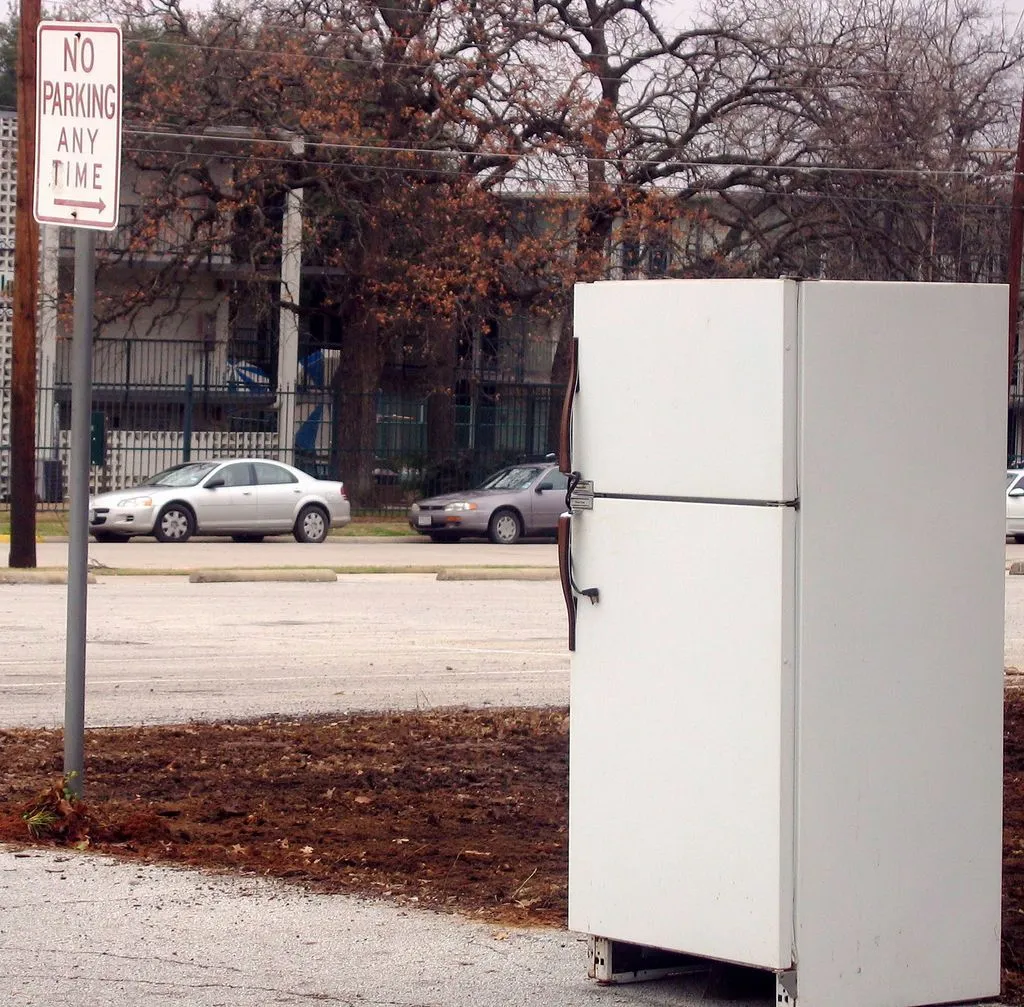
@The Lonely Refrigerator/freerangekids.com
Was there an epidemic of people using refrigerators as beds in their yards? And what about other appliances—would sleeping on a washing machine be acceptable? This law is a great example of how some laws can seem strange or outdated, but they're still part of the legal landscape.
No Flushing the Toilet After 10 PM (Switzerland)
In some apartment buildings in Switzerland, it is illegal to flush the toilet after 10 PM. This law exists due to the country’s extremely strict noise pollution regulations. The idea is that late-night flushing might disturb neighbors, especially in older buildings with loud plumbing systems.

@Ryan Old/goldcoastplumbingexperts.com.au
While it may sound absurd, some tenants have reported being warned by landlords or even fined for breaking the rule. The law is a perfect example of how Switzerland prioritizes peace and quiet, even at the cost of personal convenience. Residents often find ways to work around the restriction, such as using quieter flush settings or simply waiting until morning.
Married Women’s Drink Limit in La Paz, Bolivia
In La Paz, Bolivia, there's a rather peculiar law that limits married women to only one glass of wine in certain social settings. The law is designed to prevent any potential boozy flirtation and maintain decorum, supposedly to protect the sanctity of marriage.

@ShoweredBlueBlazered/reddit.com
This regulation, however, doesn’t apply to men, leaving them free to enjoy as many drinks as they like. The law seems to assume that women's behavior might be more easily influenced by alcohol, making it a strange form of gender-based restriction.
No Chewing Gum Allowed (Singapore)
Singapore has long been known for its strict laws but one of its most famous (and funniest) is the complete ban on chewing gum. Introduced in 1992, this law was enacted to combat the growing problem of discarded gum sticking to sidewalks, elevators, and even subway doors.
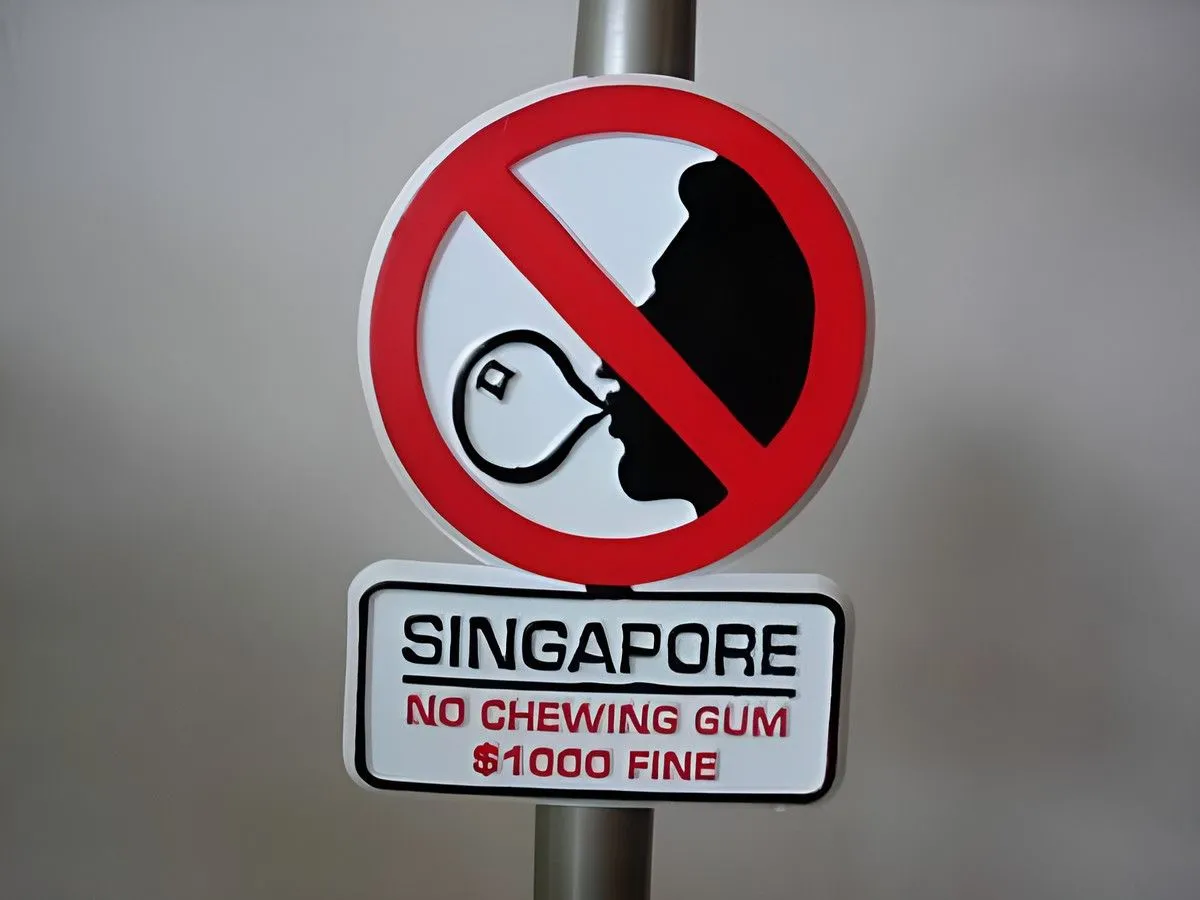
@kudaedu/facebook.com
The ban primarily focuses on the import and sale of chewing gum. Certain types of gum with therapeutic or dental benefits are allowed, but these are usually only available from pharmacies or dentists. The ban has been largely successful in reducing gum-related problems in Singapore. It's often cited as an example of how a seemingly drastic measure can be effective in achieving its goals.
No Selfies with Buddha (Sri Lanka)
In Sri Lanka, it is illegal to take a selfie with a statue of Buddha. This law is based on the belief that turning your back on Buddha is highly disrespectful, and taking a selfie is seen as an especially offensive act. Tourists caught breaking this rule have been arrested, fined, or even deported.

@BgirlMadMax/facebook.com
Authorities take this law very seriously, and many travel advisories warn visitors about it before they arrive in Sri Lanka. The law reflects the country’s deep respect for Buddhism and its religious traditions. To avoid trouble, tourists are advised to face Buddha statues respectfully and avoid taking any inappropriate photos.
No Ice Cream in Your Back Pocket (Alabama, USA)
One of the strangest laws in Alabama states that it is illegal to put an ice cream cone in your back pocket. This law dates back to the 19th century when horse thieves would use this trick to lure horses away without technically stealing them.

@CherokeeCoAlSheriffsOffice/facebook.com
Since the horse would follow the scent of the ice cream, the thief could claim they hadn’t stolen the animal—it had just wandered off! While horse theft isn’t much of a problem today, the law remains on the books. The idea of someone being arrested for simply placing a melting cone in their pocket is undeniably funny.
You Must Walk Your Dog at Least Three Times a Day (Italy)
In the city of Turin, Italy, it is illegal not to walk your dog at least three times a day. The law was introduced as part of an effort to improve animal welfare and ensure that pets receive proper exercise and care. Dog owners who fail to comply can face fines of up to €500.
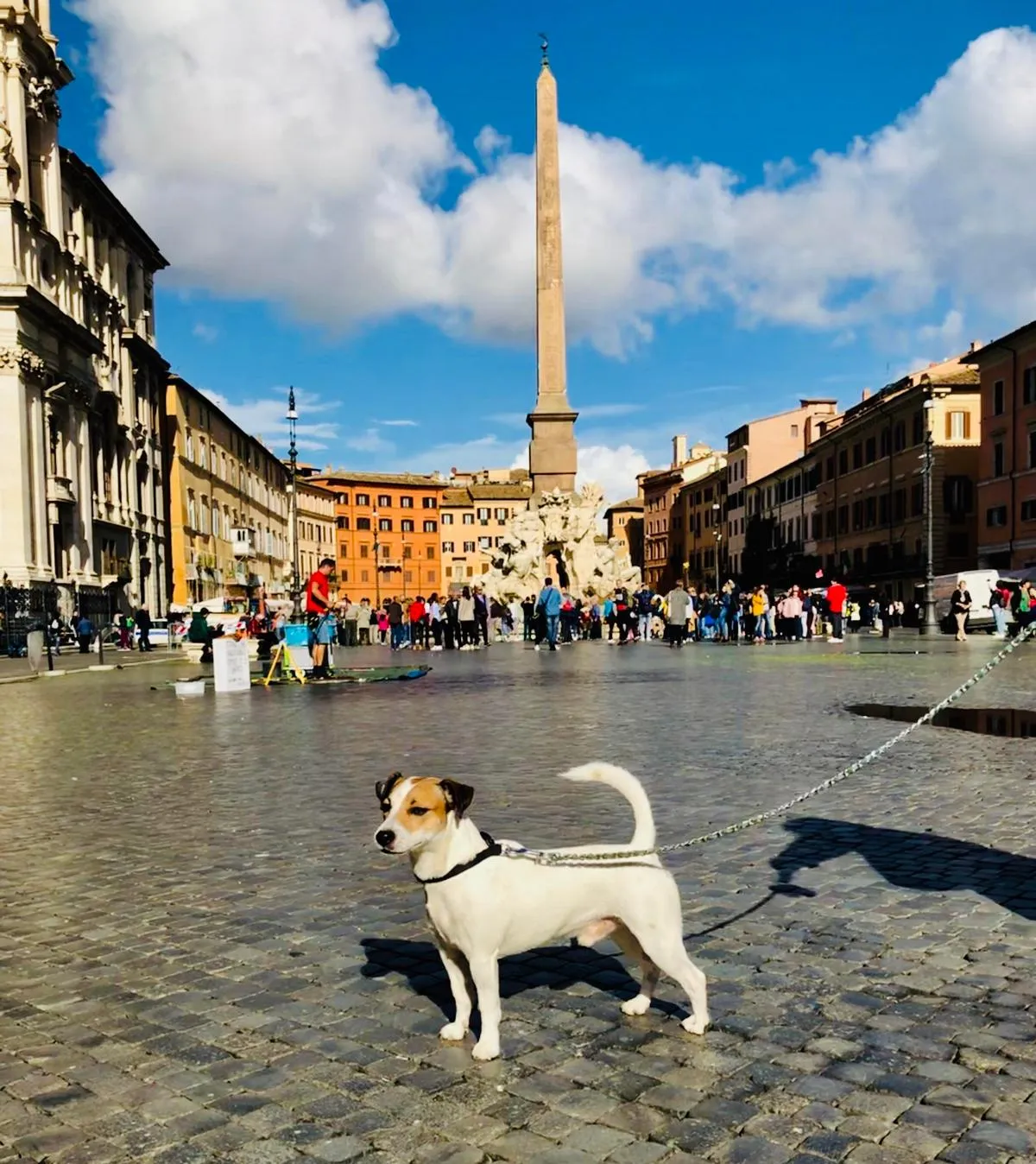
@drjjlevine/reddit.com
Of course, most responsible pet owners naturally take their dogs out for walks. But this law makes it a legal obligation. Critics argue that the rule is difficult to enforce and does not account for individual circumstances, such as a dog’s age or medical condition. However, supporters believe it helps prevent neglect and encourages people to treat their pets with more responsibility.
No Wearing High Heels at Ancient Sites (Greece)
In Greece, tourists are not allowed to wear high heels at certain ancient sites, including the Acropolis in Athens. The law was introduced to protect delicate ruins from damage caused by sharp heels. Authorities noticed that high heels were causing small cracks and erosion on ancient marble surfaces, so they decided to prohibit them.
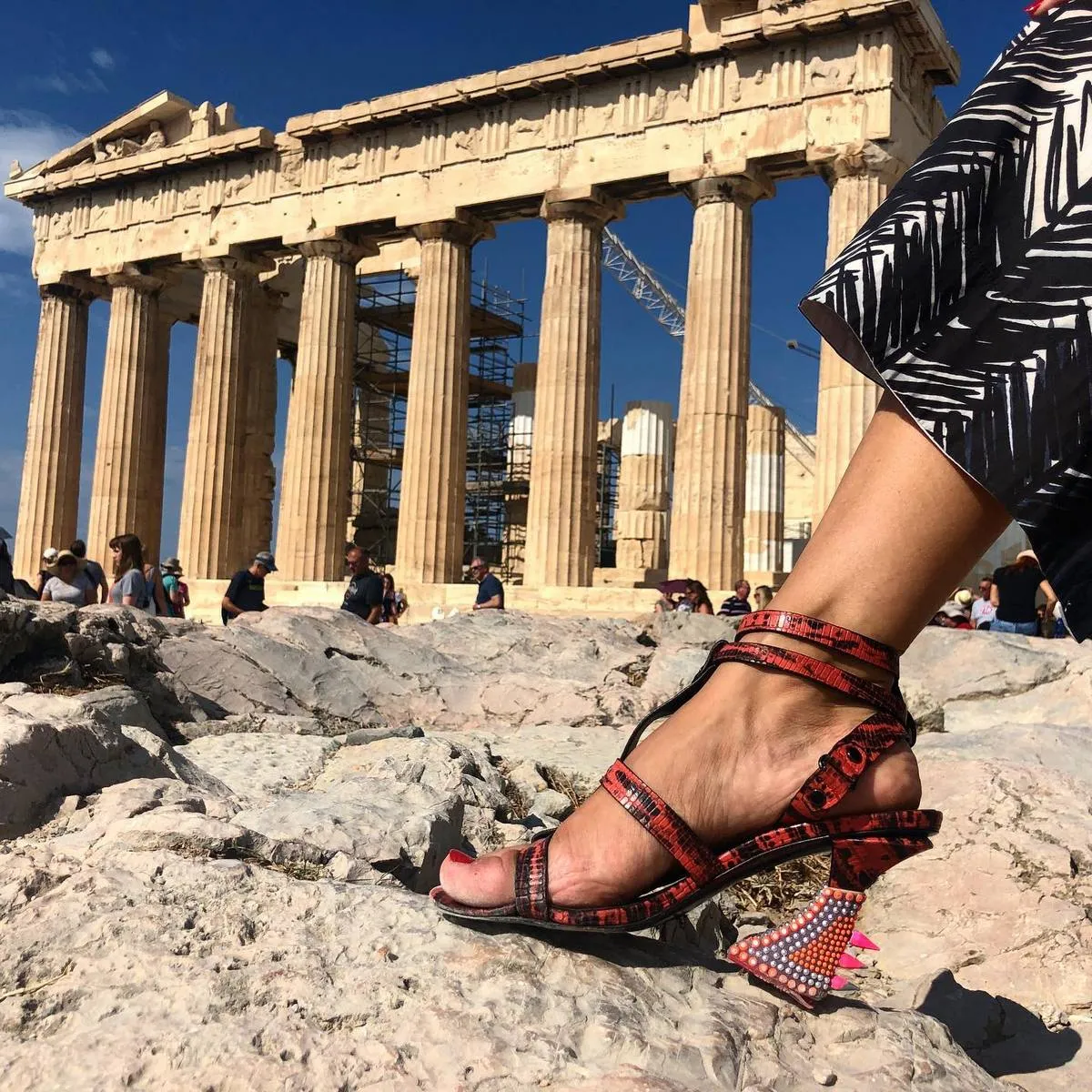
@Heelbopps/facebook.com
Tourists visiting these sites are advised to wear flat, comfortable shoes to avoid fines and preserve the historical landmarks. Historians and conservationists argue that it is necessary to prevent further deterioration of these priceless ruins. Greece takes the preservation of its cultural heritage very seriously, and this law demonstrates how even fashion choices can be restricted in the name of history.
No Driving While Wearing Flip-Flops (Spain)
Spain has a law that prohibits driving while wearing flip-flops, considering it dangerous. While driving barefoot is technically allowed, wearing flip-flops is seen as reckless. The law is amusing because it assumes that flip-flops are somehow more dangerous than driving in socks or high heels (which are allowed).
@CNNChile/facebook.com
The enforcement of this law has led to bizarre situations where drivers were fined for wearing sandals in hot weather, even though they were fully in control of their vehicles. Tourists should be especially cautious, as this law is little-known but still results in real fines.
No Running Out of Gas on the Autobahn (Germany)
Germany is famous for its Autobahn, a highway with no official speed limit in many sections. However, one strange rule states that it is illegal to run out of gas while driving on the Autobahn. The reasoning behind this law is simple: stopping on the Autobahn is highly dangerous, as the highway has no speed limit in many sections, and vehicles often travel at incredibly high speeds.
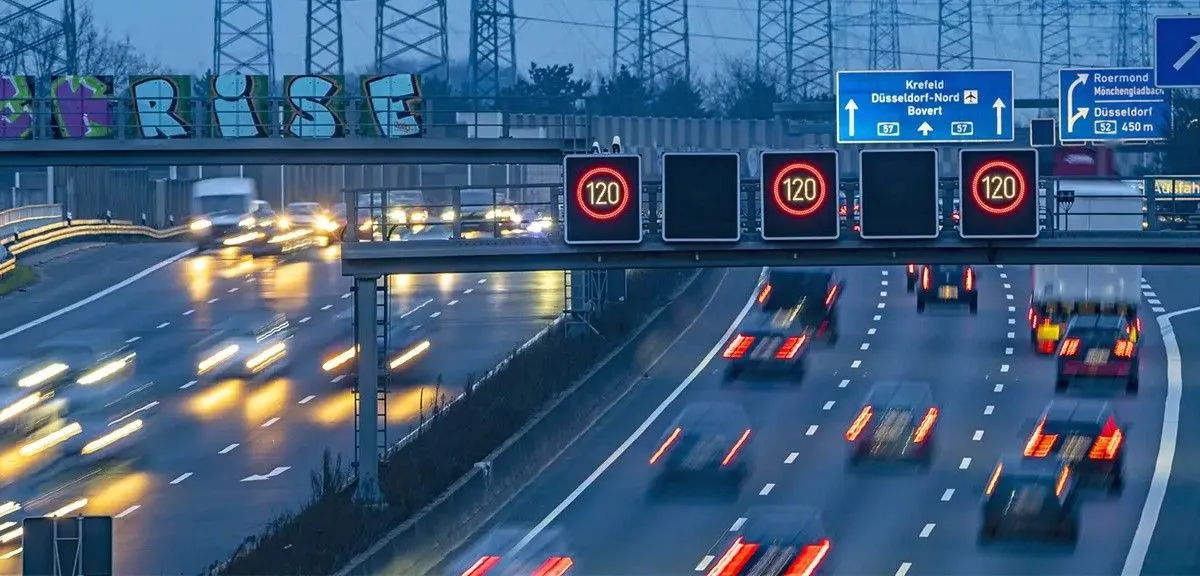
@DVR_info/x.com
Authorities consider running out of gas a preventable issue, as drivers are expected to plan their trips and refuel in advance. If a driver stops due to an empty tank, they can face a fine and even have their license suspended. Walking along the Autobahn to retrieve fuel is also prohibited, as pedestrians are not allowed on the high-speed motorway. The German government takes road safety seriously.
No Owning More Than Six Dildos (Texas, USA)
In Texas, a law states that it is illegal to own more than six dildos. The law falls under obscenity regulations but the specific number of six seems oddly arbitrary. Why six? Would owning seven be a dangerous moral offense? This law has led to numerous jokes about law enforcement conducting “raids” to count personal adult items.

@HeyEpiphora/facebook.com
While the rule is rarely enforced, it remains on the books, making Texas one of the only places where bedroom inventory is technically regulated by law. Texans looking to expand their collection may need to consider keeping their seventh item in another state.
No Wearing a Suit of Armor in Parliament (United Kingdom)
Imagine showing up to Parliament in full medieval armor. It's technically against the law in the UK. This quirky rule, part of the 1313 Statute forbidding "bringing arms" to Parliament, still stands today. Its original intent was to prevent armed individuals from disrupting parliamentary proceedings. Think less "Game of Thrones" and more "peaceful debate."

@Shooting a Welshman and Wearing Armour in Parliament/nightingalerights.com
It's a relic of a different era, a time when political disagreements might have been settled with more than just words. Nowadays, it's more of a historical curiosity than a pressing legal concern. Picture a debate on the budget suddenly interrupted by a knight charging in – it's a hilarious image.
No Feeding Pigeons in Venice (Italy)
Venice has a serious pigeon problem, which led to the introduction of a law banning the feeding of pigeons in St. Mark’s Square. Even though many tourists used to enjoy tossing crumbs to the birds, city officials decided that the pigeon population was becoming a nuisance.

@theryanharvey/reddit.com
Since then, feeding pigeons has been punishable by fines, sometimes as high as €700. The funniest part? Many tourists still try to sneakily feed pigeons, only to be caught by vigilant officers. Venice has become one of the few places where throwing a piece of bread could technically get you in trouble with the law. The pigeons, however, seem to have found other ways to keep themselves well-fed.
No Walking Backwards While Eating a Doughnut (Ohio, USA)
In Marion, Ohio, it is technically illegal to walk backward while eating a doughnut. This bizarre law was likely introduced as a joke or as part of an outdated ordinance related to public safety. Some historians speculate that it originated as a way to prevent pedestrian accidents in busy areas.

@mimishell71/pinterest.com
Locals often reference the rule as an example of how strange and unnecessary laws can persist long after their original purpose has been forgotten. Whether it was meant to address a real problem or simply to amuse lawmakers, this remains one of the most ridiculous regulations in the U.S. legal system.
Naming Regulations in Denmark: Protecting Children's Identities
Thinking of naming your newborn "Batman" or "Pluto"? Think again, if you're in Denmark. This Scandinavian country has surprisingly strict naming laws, designed to protect children from unusual or offensive names. Parents must choose from a pre-approved list of around 7,000 names.

@Could Danish childhood ever be a UNESCO world heritage site?/thedanishway.com
The law is meant to protect children from having names that could be considered offensive or embarrassing. Parents who wish to give their child a unique name must submit an application, which is reviewed by authorities. The Danish government takes naming conventions very seriously, making it one of the few places where naming a baby requires official permission.
It's Illegal to listen to K-Pop Music in North Korea
K-pop's global popularity is undeniable, but its catchy tunes and vibrant performances are a dangerous commodity in North Korea. The regime views South Korean pop culture as a corrupting influence, a threat to its iron-clad control. Listening to or possessing K-pop music isn't just frowned upon; it's a serious crime.

@noona-neomu-yeppeo/reddit.com
North Korea's laws against foreign media are draconian, with punishments ranging from lengthy prison sentences in labor camps to the ultimate penalty: execution. The government fears that exposure to South Korean culture, with its relative freedoms and modern lifestyle, could inspire dissent and challenge the regime's authority.
No Hiking Naked in the Alps (Switzerland)
Switzerland, known for its breathtaking mountains and picturesque landscapes, has a peculiar law against hiking in the nude. In 2009, a Swiss man was fined for walking naked along a popular hiking route, prompting authorities in the Appenzell region to pass a law explicitly banning the practice.

@mathiasstr/reddit.com
The law was put in place due to concerns that naked hikers might offend families, elderly tourists, and religious communities who frequent the trails. Swiss officials maintain that public decency must be respected. Those caught breaking the law can face fines of up to 200 Swiss francs.
No Water Guns on New Year’s Eve (Cambodia)
In Cambodia, using water guns during New Year’s celebrations is strictly prohibited. This law was introduced to prevent rowdy behavior and ensure public safety during the national holiday. In the past, locals and tourists would engage in playful but chaotic water fights, which sometimes escalated into aggressive encounters.

@Cambodia meshes traditional and modern worlds in Khmer New Year celebration/northwestern.edu
The government decided to crack down on the practice, fearing that water gun battles could lead to injuries or disrupt public order. Authorities conduct strict checks before the holiday, confiscating water guns from vendors and travelers.
Chickens Must Not Cross the Road (Quitman, Georgia, USA)
In the small town of Quitman, Georgia, there's a law that might make you cluck with amusement: chickens are prohibited from crossing the road. Yes, you read that right. The law states that owners must keep their chickens under control at all times, preventing them from wandering into public streets.

@The real reason why chickens cross the road/nbcnews.com
This unusual law, while seemingly comical, likely originated from concerns about public health, traffic safety, and general order. Imagine the chaos of flocks of chickens disrupting traffic or creating unsanitary conditions. So, if you're a chicken farmer in Quitman, you'd better invest in a good fence.
No Feeding Stray Dogs or Cats (Turkey)
In Turkey, a law prohibits feeding stray animals in certain public areas, such as parks and busy streets. This regulation was introduced to control the country’s large population of stray cats and dogs, which can cause public health concerns if not properly managed.

@Stray sketches: Woman sells art to feed Turkey's street dogs/dailysabah.com
Turkey is known for its kindness toward animals, with many cities providing food stations and shelters. This law has sparked controversy, as many locals and animal rights activists argue that feeding strays is an act of compassion. Some municipalities have softened their stance, encouraging designated feeding areas instead.
No Kissing at Train Stations (France)
Romance on the rails takes a back seat in France, or at least it used to. While not a nationwide law, some French train stations historically had regulations against kissing on platforms. This wasn't about prudishness, but practicality. In the bustling era of steam trains, passionate goodbyes often caused delays as couples lingered, blocking platforms and hindering departures.

@humansoferasmus/facebook.com
The "no kissing" rule aimed to keep things moving smoothly. While these regulations are largely a thing of the past in most stations, the legend persists, a charming reminder of a time when even love had to yield to the strict schedule of the French railway.
No Wearing a Fake Mustache in Church (Alabama, USA)
Alabama has a law stating that it is illegal to wear a fake mustache in church if it causes laughter. This raises several questions—what if the mustache is real but still funny? Who decides if the mustache is too amusing? And why is a fake mustache specifically targeted?

@Jeremy Henderson/thewareaglereader.com
The law likely originated from a time when pranks during church services were a problem but today, it seems absurd. Imagine a person getting arrested for an unfortunate choice of facial hair disguise simply because someone in the congregation couldn’t stop laughing.
Never Pay Canadians in Pennies (Canada)
In Canada, there’s a law limiting the number of coins you can use in a single transaction, known as the “no coin overload” rule, which is part of the Currency Act. This law was introduced to prevent people from overwhelming businesses with large amounts of small change, particularly in pennies, which are no longer in circulation.

@Ontario restaurant refuses pennies, customer shocked/cbc.ca
Under the law, pennies are restricted to a maximum value of 25 cents per transaction. For nickels and dimes, the limit is $5, while loonies (the $1 coins) can only be used up to $25, and toonies (the $2 coins) are capped at $40. This law was designed to reduce the burden of handling excessive coins, making transactions smoother and more efficient.
Nepal Bans Exporting Local Currency
In Nepal, it’s illegal to take Nepalese rupees (NPR) out of the country. This unusual regulation aims to keep the national currency within the borders and prevent it from being used in other countries. Visitors to Nepal are expected to spend all their rupees before leaving, as carrying them out of the country is strictly prohibited.

@factsnepalofficial/facebook.com
The law was implemented to maintain the stability of the Nepalese economy and to control currency outflow. It’s a unique measure compared to many other countries, where the ability to take local currency abroad is typically unrestricted. For tourists and business travelers, it means they’ll need to exchange any remaining rupees for another currency before heading home.
No Sleeping in a Cheese Factory (South Dakota, USA)
In South Dakota, USA, an oddly specific law states that it is illegal to sleep in a cheese factory. The rule likely originated as a workplace safety regulation to prevent factory workers from dozing off on the job. Given that cheese production involves heavy machinery, boiling vats of milk, and delicate processes requiring precision, falling asleep in such an environment could be dangerous.

@Emmental Cheese Factory: What to Expect During a Tour/newlyswissed.com
However, the law does not clearly specify whether this ban applies solely to employees or if an exhausted visitor who happens to nap inside a cheese factory could also face legal consequences. So, if you ever visit a cheese factory in South Dakota—stay awake!
No Whistling at Night (Lithuania)
In Lithuania, whistling indoors or outdoors at night is prohibited. This law, rooted in old superstitions, is based on the belief that whistling after dark attracts evil spirits. The law is particularly well-known in rural areas, where older generations continue to pass down the superstition.

@Want To Learn How to Whistle Like a Pro?/yahoo.com
Some residents believe that ignoring the rule could bring bad luck, while others see it as a simple measure to maintain nighttime peace. Whether one believes in the supernatural aspect or not, the law reflects Lithuania’s deep connection to folklore and cultural customs. It remains one of the country’s most peculiar legal remnants, blending ancient beliefs with modern governance.
No Watering Your Lawn While It’s Raining (United States - Various States)
Some cities in the United States, such as Los Angeles, California, and Tucson, Arizona, have passed laws that forbid watering your lawn while it’s raining. While wasting water is indeed a problem, this law seems unnecessary—why would anyone intentionally water their lawn in the rain?

@Motor-Ad-8858/reddit.com
The fact that such a law had to be written suggests that it may have actually been a common issue. Some homeowners have been fined for accidentally leaving their sprinklers on during unexpected rain showers, making the rule seem even more absurd.
No Clown Costumes in Public (France)
In France, wearing a clown costume in public is illegal in certain regions, particularly for individuals over the age of 13. This law was introduced in 2014 following a wave of "killer clown" pranks, where people dressed as clowns harassed and frightened citizens.

@Smithsonian/facebook.com
Some incidents even involved minor assaults, prompting authorities to take action. The ban is strictly enforced around Halloween when authorities fear an increase in clown-related pranks. While professional clowns performing in circuses and events are exempt, anyone caught wandering the streets in a clown outfit without authorization can be fined.
No Climbing Trees in Public Parks (Toronto, Canada)
In Toronto, it is illegal to climb trees in public parks without permission. This law was introduced to protect both people and trees from harm. Climbing can damage tree bark, break branches, and pose safety risks to individuals, particularly children.
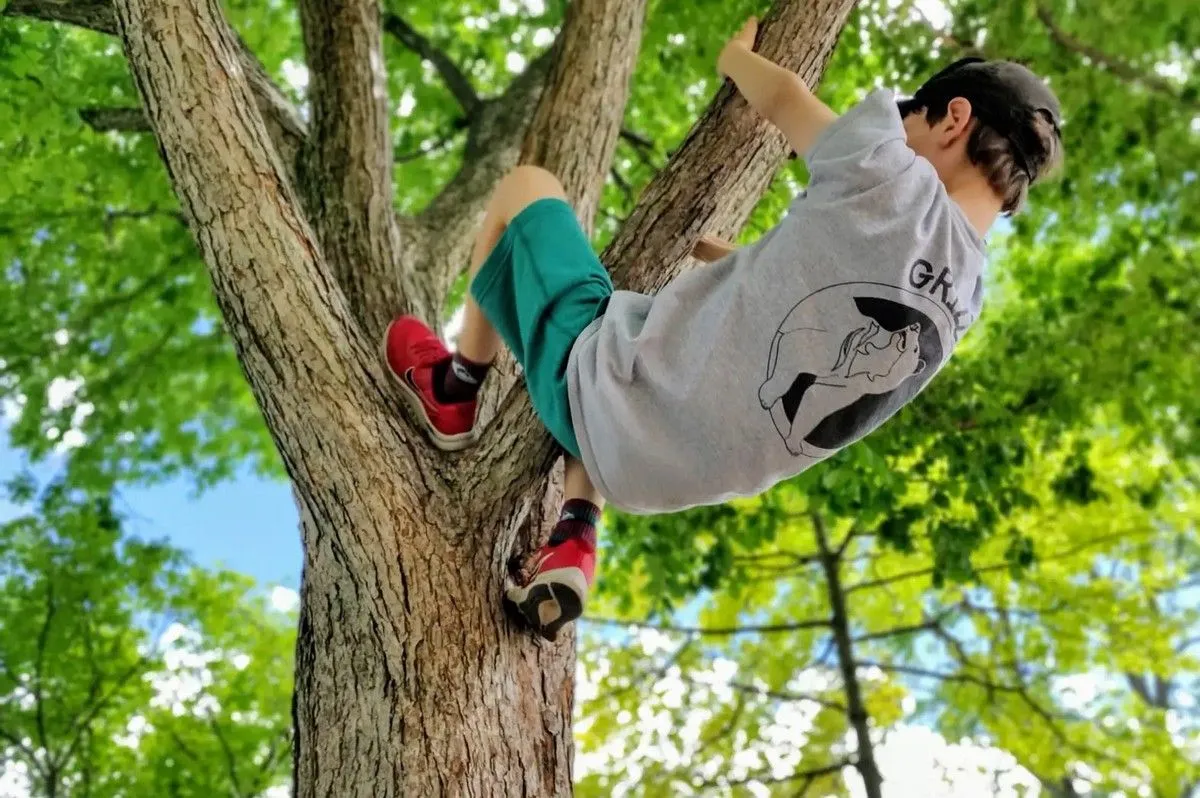
@The simple joy of climbing trees/activeforlife.com
City officials explain that it helps preserve urban greenery and prevents potential lawsuits from injuries. Signs in many Toronto parks explicitly state that tree climbing is not allowed, and enforcement officers can issue fines for violations. However, nature enthusiasts and parents have criticized the law, claiming that climbing trees is a fundamental childhood activity.
Dirty Cars Illegal in Abu Dhabi
In Abu Dhabi, it's illegal to have a dirty car, and this strict regulation is part of the city's efforts to maintain a clean and pristine image. All residents are expected to keep their cars spotless, with no dust or grime allowed to accumulate.

@[deleted]/reddit.com
Failure to comply with this law can lead to authorities impounding your car and a fine of 500 Dirhams (approximately US$136.13). The city also has a rule that prevents you from washing your car in public. This measure was introduced to conserve water and avoid road damage, as water runoff can cause erosion and harm the city's pavements.
You Can’t Drive Blindfolded (Alabama, USA)
While most traffic laws are based on common sense, Alabama decided it was necessary to explicitly outlaw driving while blindfolded. This law raises an important question: Was this a big enough problem in the past that legislators felt the need to ban it?
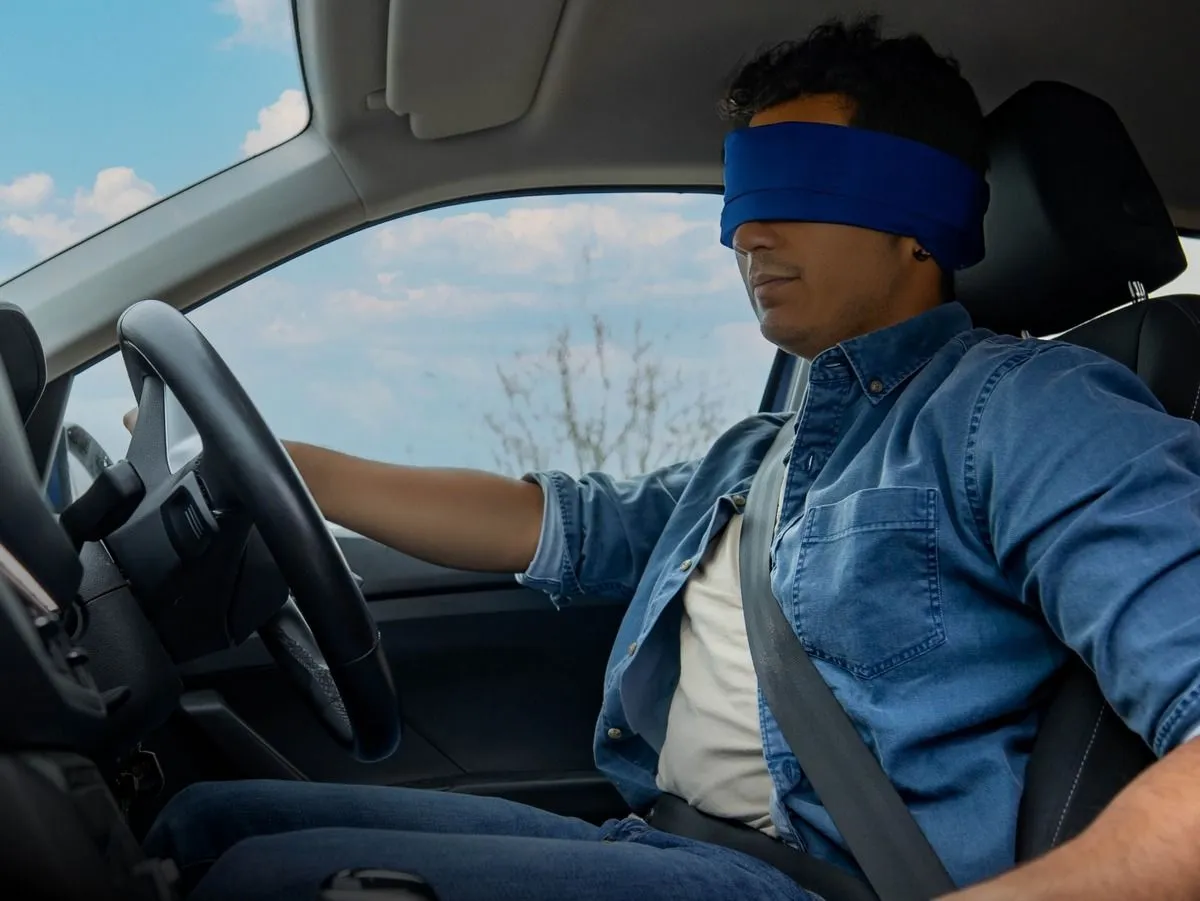
@Vision Zero South Wes/facebook.com
The idea of someone getting behind the wheel while blindfolded is absurd, yet Alabama lawmakers went out of their way to make sure no one ever attempted it. Perhaps someone once tried to prove their incredible driving skills or participated in an ill-advised dare.
Sandcastle Ban in Eraclea, Italy
In Eraclea, Italy, building sandcastles is officially illegal—and this strange law has to do with maintaining "public decorum." While beach-goers are free to enjoy the sun and surf, if they spot a child with a bucket and spade, ready to build the perfect castle, they are obligated to stop them.

@squid50s/reddit.com
This unusual law was passed to preserve the beach’s aesthetic and prevent potential chaos caused by the sand structures. Although many associate sandcastles with carefree childhood fun, in Eraclea, the act is seen as an infringement on the visual order of the public space. So, next time you visit Eraclea, make sure to leave your bucket and spade at home!
No Wrestling with Bears (Missouri, USA)
In Missouri, it is illegal to wrestle with a bear—yes, you read that right. This law was introduced to protect both humans and bears from unnecessary harm. In the past, some entertainment venues and events featured bear wrestling matches, where people would challenge trained or captive bears for sport.

@Pounce-Matics Amuse-Matics Page/facebook.com
As animal welfare laws became stricter, authorities banned the practice to prevent cruelty. Today, the law is more of a historical relic but it remains technically enforceable. It serves as a reminder that wildlife should be respected rather than treated as a source of amusement.
No Making Ugly Faces at a Dog (Oklahoma, USA)
Oklahoma has a law that states it is illegal to make ugly faces at a dog. The reasoning behind this law is unclear but it likely exists to prevent animal cruelty. However, defining an “ugly face” is entirely subjective—who decides if a human expression is offensive to a dog?

@DerpanJones/reddit.com
Could someone be arrested if their natural resting face scares a Chihuahua? And what if the dog simply misinterprets a friendly smile as threatening? This law raises more questions than answers and adds to the list of strangest animal-related laws in America.
Portugal's Peculiar Law: No Peeing in the Ocean
Portugal’s quirky law prohibiting peeing in the ocean is as amusing as it is unexpected. This regulation highlights the country’s commitment to preserving its pristine coastal waters. The law, though difficult to enforce, serves as a reminder of the importance of respecting marine ecosystems.

@Caturistas/facebook.com
Urine, though mostly water, contains compounds like urea that can contribute to nutrient pollution, potentially harming aquatic life. Portugal, known for its stunning beaches and rich maritime heritage, takes environmental stewardship seriously.
You Must Own a Burial Plot Before You Die in Sarpourenx, France
In the small French town of Sarpourenx, planning for the afterlife isn't just a spiritual matter; it's a legal obligation. A rather unique local ordinance requires residents to own a burial plot before they die. This unusual law, implemented in the 1980s, stemmed from a practical problem: a lack of space in the local cemetery.

@strykerzr350/reddit.com
The logic behind this seemingly morbid regulation is straightforward. It prevents families from scrambling to find burial space during a time of grief, potentially leading to disputes or delays. It also helps the town manage its cemetery space efficiently and ensures that everyone has a dignified burial option.
Cuba's Separate Transport Systems for Locals and Tourists
In Cuba, tourists are prohibited from using the local transport system, which is reserved exclusively for Cuban residents. The country has a separate transport system for visitors, ensuring that tourists don’t blend into the everyday routines of the locals.

@Getting around Cuba: Transportation Tips/roughguides.com
This regulation also extends to unregistered private drivers, meaning accepting rides from them is illegal. The goal behind these rules is to separate the two groups and manage the flow of people, especially considering the differences in pricing and infrastructure between the two systems.
Durian: Banned for Its Smell in Southeast Asia
In many Southeast Asian countries like Indonesia and Malaysia, the infamous durian fruit is so pungent that it's been banned in public places like buses, trains, and schools. While most Americans may not be familiar with the fruit, locals know it all too well.

@rumtea/reddit.com
The strong, distinctive smell of durian is often described as a mix of turpentine, onions, and “an old gym sock”—a description that may make you think twice before indulging. Even though durian is considered a delicacy in these regions and offers numerous health benefits, its smell is so overpowering that it has led to strict laws prohibiting it in enclosed public spaces.